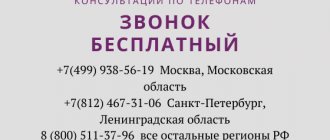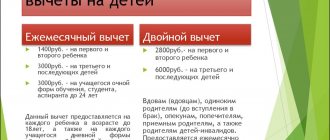The concept of having many children
Families raising three or more minor children can receive the status of large families. Based on Decree of the President of the Russian Federation No. 431 “On measures for social support of large families” dated May 5, 1992 (as amended in 2003), recognition of large families and receipt of various benefits is carried out at the level of regional authorities, and therefore may differ significantly in different subjects of the federation.
A family with many children is considered until one of the three children comes of age, or can apply for an extension of status when the child enrolls in full-time higher education. Benefits and benefits for having many children are equally valid for both natural and adopted children.
Work upon dismissal
According to the Labor Code of the Russian Federation, an employee is obliged to inform the employer of his intention to resign two weeks in advance. During this period, a new employee is selected and trained for upcoming tasks. In this case, benefits for mothers of many children according to the Labor Code are not provided for mothers of many children.
If there is a valid reason requiring urgent dismissal, it is possible to sign an application without working out. Legislation does not establish valid reasons. This issue is completely resolved by the employer.
Along with the privileges for mothers of many children, there are also benefits for fathers with many children raising more than three children. Especially if the man is the only breadwinner in the family.
Who is eligible to receive the status of father of many children?
Either a full family or one of the parents who actually cares for the children and lives with them can be considered a large family.
The status of a father of many children can be obtained by men raising three or more minor children, regardless of the fact of divorce from their mother/mothers, widowhood or official deprivation of maternal parental rights. The concept of “father of many children” appeared in legal legislation not so long ago; previously, legislative acts defined large families only in relation to the mother. However, virtually every region has given and continues to provide significant support to large families, including single fathers.
There are two ways to obtain the status of a father of many children:
- make a family card - a certificate issued to a large family in one copy, listing all its members and indicating relationships;
- make an individual ID - a document with a photograph of the father and a list of children (the same is issued separately by the mother if the spouses are legally married).
Important: a father who does not live with the children, is obliged to pay alimony for their maintenance, has restrictions on parental rights or has been deprived of them has no right to be considered as having many children. Also, the count of large families does not include children who are fully supported by the state (for example, in a boarding school) or who are legally placed under the guardianship of other persons.
Labor benefits, the validity of which is disputed by employers
In 2014, the Supreme Court of the Russian Federation expressed its unambiguous position on the labor issue of the rights granted by previously existing acts in the field of labor relations. They have retained some of their power to this day. We were talking about the right to receive annual leave in the summer or other convenient period in the first place. These rights are valid until the legal acts of the Soviet period are officially repealed. Or a federal law has not yet been adopted that solves this issue differently. We describe typical ways to resolve legal issues, but each case is unique and requires individual legal assistance. To quickly resolve your problem, we recommend contacting qualified lawyers on our website.
What benefits does a father of many children have?
Having many children is often associated with a difficult financial situation, which the state tries to compensate for with cash payments and various benefits in the most important areas of life. Thus, fathers of many children enjoy the following privileges:
- compensation for utility bills (from 30 to 70%)
- child tax credits;
- obtaining a place in a nursery or kindergarten out of turn;
- compensation for preschool fees;
- free meals in schools, discounts on educational literature;
- providing the whole family with free entry to museums, theaters and other cultural institutions (once every month);
- transport benefits (free travel on city public transport, discounts on intercity travel, reduced transport tax, free parking);
- assistance in the healthcare sector - free children's medicines (up to age 6), treatment in sanatoriums, free trips to children's health camps.
The only difference between fathers with many children and mothers is very significant - women are provided with a whole package of pension benefits that are not available to fathers (for example, early retirement, accrual of points at increased coefficients, etc.)
Cash payments in Russia to single fathers
Fathers with many children have the right to apply for financial support from the state at several stages:
- A one-time payment of birth benefits is available to single fathers upon adoption of a child. For 2020, at the federal level, this payment is equal to 16,759.09 rubles, and for the adoption of a disabled child, a child over seven years old, children who are brothers and (or) sisters - 128,053.08 rubles. In the regions, additional payments for adoption have been established, which are indexed by regional authorities.
- Child care benefit - issued at the place of work and amounts to 40% of average earnings, its payments last until the child reaches one and a half years old. If there are two children under the age of 18 months, then the benefit is paid for each; if the father is raising three or even more children at once who are not yet 1.5 years old, then the payment will be 100% of average earnings.
- Material payments for children from 1.5 to 18 years old are made at the expense of the regional budget. Therefore, their size and frequency are regulated by the legislation of the constituent entities of the Russian Federation. This benefit is paid only to low-income single fathers, regardless of whether he works or not (the monthly income for each family member does not exceed the subsistence level). To receive this benefit, you must submit a package of documents to the Social Protection Service. Also, the SSZN authorities may change the indexing of payments taking into account annual updates of the list of regions with low birth rates.
What subsidies are available?
The main subsidies that a father with many children should take advantage of are related to the opportunity to improve living conditions.
The state provides a choice of possible options, each of which is regulated not only at the federal, but also at the local municipal level. Subsidies cover both the purchase of finished housing and self-construction. In addition, the country's main banks take into account the factor of large families and offer loans and mortgages on preferential terms. In addition, large families have the right to receive a free plot of land from the local administration if they are registered as in need of improved housing conditions. This land can be used at the discretion of the new owners (for the construction of a house, dacha, farm, remain a plot of land for growing crops, can be sold).
Land is issued by the municipality only once for one large family! Therefore, if the plot does not correspond to the wishes and capabilities of the family, there is an option to refuse it and continue to wait in line to receive land.
Benefits at work: what are provided?
A father with many children has the right to 100% sick pay, regardless of other factors. Also, providing the HR department with a certificate for a father of many children allows you to add leave (up to 14 days at your own expense in accordance with Article 263 of the Labor Code of the Russian Federation). Without significant grounds, they do not have the right to be fired, like other employees (only in case of gross violation of labor discipline, or during the liquidation of the enterprise).
Cash payments
Mothers of many children receive certain cash payments from the state, which are designed to help parents provide everything their children need. Among them are the following:
- When a second or more child is born in a family, parents receive a monthly payment of 5,153 rubles.
- The so-called compensation cash payments associated with an increase in the standard of living. Paid 600 rubles. for each child, if there are 3-4 children in the family, and 750 rubles. if there are 5 or more children. Payments are made until your 16th birthday. Up to 18 years of age they pay for a child who studies at an educational institution.
- If parents have five or more dependent children, a compensation payment of 900 rubles is due.
- Very young children, up to three years old, are paid compensation for baby food monthly in the amount of 675 rubles.
- Payments to mothers of large families are also provided for utility bills. So, if a family has 3-4 children, 522 rubles are compensated monthly. If there are 5 or more dependent children, then the amount of compensation increases to 1044 rubles.
- If there is a landline telephone in the house where a large family lives, the fee for its use is also compensated in the amount of 230 rubles. per month.
- Particularly “distinguished” mothers with many children, who have given birth to or are raising 10 children or more, receive monetary compensation from the state for each child up to 16 years of age (or up to 23, if the child is a full-time student). The amount of monetary compensation is 750 rubles. for each child.
- At the time of registration and receipt of a pension, a woman who has raised ten children receives a one-time payment of 10,000 rubles.
- For the holidays, families with 10 or more children also receive cash rewards. So, on International Family Day they are entitled to 10,000 rubles. from the state as a token of gratitude for their contribution to increasing the birth rate and preserving the cult of family. By the Day of Knowledge, they are also not left without help. The family is paid 15,000 rubles. for collecting children for school.
- Mothers who have given birth to or adopted more than 7 children receive a medal of Parental Glory. Simultaneously with this event, they are awarded a prize of 100,000 rubles.
Peculiarities of registration of status for children from different wives
When a father is raising children from different women, the need falls on his shoulders not only to create a psychologically comfortable atmosphere for the children, but also to correctly formalize the marital status from the point of view of the law.
So, first of all, children must live with their father and be supported at his expense. To confirm the fact of cohabitation, it is necessary to present certificates of registration of children in the same housing with their father. If children are registered in other places, then cohabitation is proven in court.
Secondly, one should take into account the status of ex-wives, on which the procedure for obtaining benefits and allowances directly depends. If the child’s natural mother is no longer considered as such from a legal point of view, then the father is recognized as a single parent. If the child’s mother shares the rights to raise and communicate with him, then by law she is obliged to pay alimony for his maintenance, which is taken into account when calculating the payments due to the father from the state.
When a family consists not only of children from the father’s previous marriages, but also of a child whose parents are registered spouses, the wife has the opportunity to also obtain the status of a mother of many children. This can be done in the case when the adopted children are officially adopted by her, which is possible if the parental rights of the natural mother are deprived. When registering guardianship or guardianship over step-children during marriage, a woman does not have many children.
Thus, the legislation of the Russian Federation provides fathers with many children with comprehensive support, which previously only mothers could count on. State financial assistance, various subsidies, and benefits enable fathers with many children to provide their children with decent conditions for growth and development.







